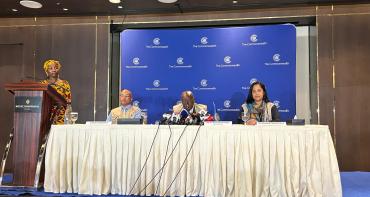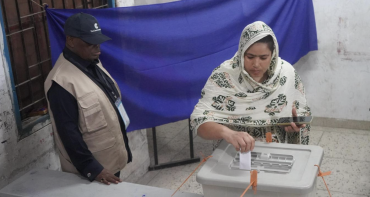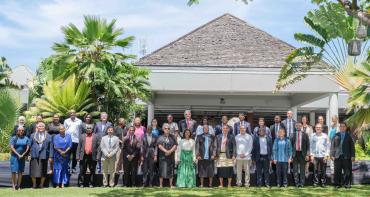Statement by HE Thabo Mbeki
Former President of the Republic of South Africa
Chairperson of the Commonwealth Observer Group
Introduction
The Commonwealth is honoured to have been invited by the Independent National Electoral Commission of the Federal Republic of Nigeria (INEC) to observe these significant elections. These are the seventh successive elections that the Commonwealth has been invited to observe in Nigeria since 1999. Our Group began arriving in Abuja on 18 February, and will depart by 2 March after we have finalised our report.
The Group was briefed by key Nigerian stakeholders including INEC, the police, political party representatives, the judiciary, civil society organisations, youth representatives, media and citizen observers, other regional and international observer missions and Commonwealth High Commissioners.
Our observers were deployed across Nigeria from 23 February covering the Federal Capital Territory (Abuja), Benue (Makurdi), Edo (Benin City), Kano, Lagos, Ondo (Akure), Rivers (Port Harcourt), and Sokoto states.
Following our deployment, we met with citizen, regional and international observers, to build a comprehensive picture on the conduct of the electoral process. We observed INEC preparations for the distribution of sensitive and non-sensitive materials, as well as preparations by local security agencies.
On 25 February, the observers visited polling units to observe the opening, accreditation, voting, counting and collation of results, following which they returned to Abuja for debriefing and preparation of our final report.
Our preliminary findings will be shared in the following manner: We will first provide our key findings on the pre-election environment, after which we will focus on our observations on Election Day. Finally, we will share our reflections on the post-election environment. This approach is in line with our mandate, as underscored in the arrival statement we issued on 20 February 2023.
The final report, setting out our full findings on the entire process and our detailed recommendations, will be submitted to the Commonwealth Secretary-General.
I will now turn to the initial observations of the Commonwealth Observer Group:
Pre-election environment
As Africa’s largest democracy and a valued member of the Commonwealth, the eyes of the continent, and the world, have been on Nigeria. It is noteworthy that there was a marked increase in the number of registered voters from the previous election from 84 million in 2019 to more than 93 million voters.
It is noted that these elections took place following the enactment of a new Electoral Act, signed into law exactly a year prior to the conduct of these elections. Important amendments include funds for the elections that have to be disbursed to INEC a year in advance of the elections; the requirement for political parties to conduct their primaries much earlier to allow INEC to effect better planning in advance of elections; and legal backing for the use of electronic accreditation of voters and digital results transmission; and assistance to People with Disabilities, among others.
We welcome the signing of the National Peace Accord on 22 February by all political parties shortly before the elections, which was witnessed by the Commonwealth Secretary-General, and other leaders.
We note incidences of election-related violence and insecurity, some of which regrettably resulted in the loss of life and postponement of elections in some polling units. We also observed that these elections took place amidst a Naira demonetisation policy and fuel scarcity. This notwithstanding, we observed that Election Day proceeded largely peacefully. The determination, patience and resilience of all those Nigerians who turned out to vote in these elections, are to be highly commended.
We note that there was only one-woman presidential candidate out of the total of 18. While there have been concerted efforts to advance progress in increasing women’s political participation as candidates since the 2019 elections, including the tabling of a private member’s bill in parliament to promote gender equality, we note that this bill was not passed.
The vibrant participation by the youth in these elections was evident, especially in campaigns and on social media. We observed the significant role of youth as INEC officials.
We note that the campaign was vibrant and colourful, with the adoption of robust campaign methods, including numerous billboards, posters and large, very well attended rallies, as well as active social media campaigns. We welcome the role played by the media in covering the elections, but also note several challenges which were reported to the observers, including concerns about the safety of journalists, disinformation and incidences of hate speech on social media.
Election Day observations
Pre-poll procedures and opening of polls
Our observers noted significant delays in the opening of polls in most of the polling units observed, which impacted on pre-poll procedures. In some instances, polling officials arrived late at their designated polling units, while in other instances, there were gaps observed in the timely supply and delivery of essential materials.
Lack of Advance Voting
We noted that polling staff, security personnel and other essential workers deployed on Election Day were unable to vote and were therefore disenfranchised from the process.
Role of polling staff and polling procedures
Polling staff conducted their duties transparently, although in some cases there were inconsistencies in applied procedures.
At some polling units, voters were encouraged to check their names on the Voter Register before they could join the queue to avoid being turned away for being at the wrong polling unit. This is commendable.
Use of Technology
While the Bimodal Voter Accreditation System (BVAS) functioned satisfactorily in most polling units, our observers reported that the BVAS was faster on facial recognition than on detecting fingerprints of the voters during the accreditation process. The requirement to first try fingerprint recognition slowed down the process, as did issues of connectivity and training. There was general trust by officials, agents and voters in the integrity of the BVAS.
Ballot papers
Several challenges were encountered with ballot papers. The Group has not been able to establish the full details regarding these issues, but will make more substantive comments in the final report, where necessary.
Communication strategy of INEC
INEC provided public assurances of its preparedness and readiness to conduct the elections as scheduled, including recruitment and training of polling staff, distribution of materials and other logistics, in advance of Election Day. While we commend the fact that INEC conducted press conferences at various intervals, we noted that INEC’s identification and measures to address various logistical challenges, which were experienced on Election Day, were not always communicated in real time.
Voter turnout
We observed that there was variation in voter turnout. We will explore this aspect further and provide an assessment in our final report.
Participation and Inclusion
It was encouraging to note that priority was accorded to pregnant and nursing mothers, persons with disabilities and elderly people. INEC is also to be commended for its efforts at fostering greater inclusion, especially for persons with disabilities, by providing assistive devices at polling units, including braille ballot guides and magnifying glasses.
Role of party agents
Party agents of political parties were present in many polling units. Party agents are an important element of the electoral process, but their behaviour as observed was not always positive.
We witnessed a number of polling units with significant numbers of party agents, many of whom were not wearing INEC-accreditation badges.
Security
The Group observed the presence of security officials at most polling units. They were professional, unobtrusive, carried out their duties diligently, and respected the right of voters to cast their ballots.
Secrecy of the ballot
Some polling units observed were in open spaces while others were in tents and indoors, in public buildings. Therefore, the layout varied from polling unit to polling unit. For the most part, the secrecy of the ballot was assured, though we noted in some cases that the positioning of polling booths potentially compromised secrecy. In a number of polling stations, voters could have benefitted from more voter education on the folding of ballot papers, as some voters were unintentionally exposing their vote on their ballot papers.
Situation Rooms
As Chairperson, I had the opportunity to visit several situation rooms on Election Day, including the Nigeria Civil Society Situation Room, the Gender and Election Watch Situation Room and the Inclusive Friends Data Center. Some of our observers also managed to visit other situation rooms, including YIAGA Africa and the CLEEN Foundation Situation Rooms. These initiatives should be encouraged, as they enhance transparency and provide a national perspective on key data emerging from the electoral process, especially on Election Day. This instils a degree of confidence in the electoral process.
Close and Count
Due to the late start, there were still long queues at some polling units at the time of the closing of the polls. However, it was observed that those who were in the queue at 2:30 pm when the polls closed, were allowed to vote.
The close and count followed the due process for the most part, with a high degree of transparency.
Though various polling units experienced significant delays in closing due to their late openings, we found that the management of closing and count procedures varied in consistency. One of the marked challenges we noted was the fact that, as voting hours were extended, the close and count had to take place in the dark in many cases. It was noted that, at some polling units, there was no proper lighting to facilitate counting at night. We note that lamps were not provided to polling staff to assist them in carrying out their crucial duties at this phase of the process.
Results Management
We observed that the results were not uploaded on the INEC Results Viewing (IReV) Portal in real time, as expected. We acknowledge the statement released by INEC in this regard.
Conclusion
As the results process continues, let me end by reiterating the desire that all Nigerians, especially the candidates who contested the elections, continue to uphold their pre-election commitment to peace. The Group strongly encourages all Nigerians to exercise patience to allow INEC and its staff across the country to conclude the results process effectively and peacefully.
We wish to reiterate the assessment of the previous Commonwealth Observer Group in 2019, that electoral reform remains a continuous process, building on what has worked successfully, addressing shortcomings in an inclusive and transparent manner that is welcomed by all relevant interested parties to various aspects of the electoral process.
We encourage INEC to conduct a thorough post-election review of the electoral process to draw constructive lessons from previous elections, and would also encourage consideration for the establishment of appropriate domestic mechanisms to take forward recommendations proposed by all citizen and international observer missions.
The Commonwealth Observer Group will make relevant recommendations in its final report.
Notwithstanding the shortcomings identified in these elections, Nigerians were largely accorded the right to vote. We trust that the final stages of collation and announcement of results will continue to be handled in a transparent, peaceful and credible manner.
We congratulate all Nigerians for their determination, patience and resilience displayed throughout the electoral process. We call on all Nigerians to maintain the same commitment in the post-election period, especially as Nigeria prepares to return to the polls on 11 March for the gubernatorial elections. We call on all those with grievances to address disputes through prescribed legal channels. The time now is for restraint and continued patience as we await the final results.
I thank you.
Abuja, 27 February 2023
- Download a PDF version of the Interim Statement
- Elections 2023: Commonwealth Observer Group in Nigeria
Media contact
- Snober Abbasi Senior Communications Officer, Communications Division, Commonwealth Secretariat
- T: +442077476168 | E-mail



